Human Rights Watch urges the European Commission to assess the impact of state-imposed forced labor in China's Xinjiang region in Electric Vehicle sector
We are writing on behalf of Human Rights Watch with regard to the decision of the European Commission on June 12 to announce tariffs on Chinese electric vehicles (EVs) imported into the European Union.
cross-posted from: https://feddit.org/post/390314
> "We encourage you to consider, beyond the state subsidies, other reasons leading Chinese EVs to be sold at prices below market in the EU," Philippe Dam, EU Advocacy Director at Human Rights Watch (HRW), writes in an open letter to the European Commission. > > Refering to the EU's ongoing consultations with Beijing regarding tariffs on Electric Vehicles (EVs), HRW asks the Commission to "urge the Chinese government to end crimes against humanity against Uyghurs and Turkic Muslims in Xinjiang and elsewhere and implement the recommendations of the August 2022 OHCHR report on Xinjiang". > > HRW demands three points: > - Release everyone who remains arbitrarily detained or imprisoned > > - Investigate and appropriately prosecute government officials implicated in serious violations of human rights and crimes against humanity > > - Grant free and unfettered access to Xinjiang to independent monitors, as requested by the UN High Commissioner for Human Rights and several UN Special Procedures > > The rights groups also calls to ensure coherence with the pending Forced Labor Regulation, which enables the European Commission and EU member states to take steps to block entry into the EU market for products made with forced labor.
Human Rights Watch urges the European Commission to assess the impact of state-imposed forced labor in China's Xinjiang region in Electric Vehicle sector
We are writing on behalf of Human Rights Watch with regard to the decision of the European Commission on June 12 to announce tariffs on Chinese electric vehicles (EVs) imported into the European Union.
cross-posted from: https://feddit.org/post/390314
> "We encourage you to consider, beyond the state subsidies, other reasons leading Chinese EVs to be sold at prices below market in the EU," Philippe Dam, EU Advocacy Director at Human Rights Watch (HRW), writes in an open letter to the European Commission. > > Refering to the EU's ongoing consultations with Beijing regarding tariffs on Electric Vehicles (EVs), HRW asks the Commission to "urge the Chinese government to end crimes against humanity against Uyghurs and Turkic Muslims in Xinjiang and elsewhere and implement the recommendations of the August 2022 OHCHR report on Xinjiang". > > HRW demands three points: > - Release everyone who remains arbitrarily detained or imprisoned > > - Investigate and appropriately prosecute government officials implicated in serious violations of human rights and crimes against humanity > > - Grant free and unfettered access to Xinjiang to independent monitors, as requested by the UN High Commissioner for Human Rights and several UN Special Procedures > > The rights groups also calls to ensure coherence with the pending Forced Labor Regulation, which enables the European Commission and EU member states to take steps to block entry into the EU market for products made with forced labor.
Human Rights Watch urges the European Commission to assess the impact of state-imposed forced labor in China's Xinjiang region in Electric Vehicle sector
We are writing on behalf of Human Rights Watch with regard to the decision of the European Commission on June 12 to announce tariffs on Chinese electric vehicles (EVs) imported into the European Union.
"We encourage you to consider, beyond the state subsidies, other reasons leading Chinese EVs to be sold at prices below market in the EU," Philippe Dam, EU Advocacy Director at Human Rights Watch (HRW), writes in an open letter to the European Commission.
Refering to the EU's ongoing consultations with Beijing regarding tariffs on Electric Vehicles (EVs), HRW asks the Commission to "urge the Chinese government to end crimes against humanity against Uyghurs and Turkic Muslims in Xinjiang and elsewhere and implement the recommendations of the August 2022 OHCHR report on Xinjiang".
HRW demands three points:
-
Release everyone who remains arbitrarily detained or imprisoned
-
Investigate and appropriately prosecute government officials implicated in serious violations of human rights and crimes against humanity
-
Grant free and unfettered access to Xinjiang to independent monitors, as requested by the UN High Commissioner for Human Rights and several UN Special Procedures
The rights groups also calls to ensure coherence with the pending Forced Labor Regulation, which enables the European Commission and EU member states to take steps to block entry into the EU market for products made with forced labor.
Peru grants China's state-owned Cosco Shipping the exclusive right to operate its Chanchay port while pressure is built to construct a highway across the Amazon rainforest
On the eve of the meeting between President Boluarte and Xi Jinping, Peru drops its lawsuit over exclusivity. The facility will be inaugurated in November, giving direct access to the region to the largest container ships from Asia. Pressure is building for a new Trans-Amazonian Highway to connect t...
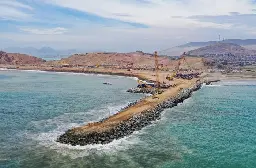
cross-posted from: https://feddit.org/post/384247
> - Peru and Cosco Shipping, a Chinese state-owned construction company, have settled a dispute over the business model to be put in place for the Port of Chancay, built under China's "Belt and Road Initiative". The company is granted the exclusive right to operate the port after it is inaugurated in a few months. > > - Earlier this year, however, as the work neared completion, Peruvian government lawyers filed a lawsuit challenging the exclusivity granted to the Chinese company, saying the facility should be available to other container handling companies as well. > > - But Chinese lenders and Peruvian industrial groups harshly criticized the move. Now, with Peruvian authorities taking a step back, the impasse should be settled. > > - Various business groups are now pushing for the construction of a road between the port and the Brazilian state of Acre, to speed up access to maritime trade with Asia, at the cost of more harm to the Amazon rainforest.
Peru grants China's state-owned Cosco Shipping the exclusive right to operate its Chanchay port while pressure is built to construct a highway across the Amazon rainforest
On the eve of the meeting between President Boluarte and Xi Jinping, Peru drops its lawsuit over exclusivity. The facility will be inaugurated in November, giving direct access to the region to the largest container ships from Asia. Pressure is building for a new Trans-Amazonian Highway to connect t...
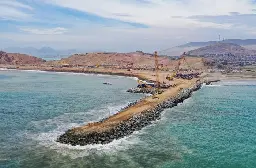
cross-posted from: https://feddit.org/post/384247
> - Peru and Cosco Shipping, a Chinese state-owned construction company, have settled a dispute over the business model to be put in place for the Port of Chancay, built under China's "Belt and Road Initiative". The company is granted the exclusive right to operate the port after it is inaugurated in a few months. > > - Earlier this year, however, as the work neared completion, Peruvian government lawyers filed a lawsuit challenging the exclusivity granted to the Chinese company, saying the facility should be available to other container handling companies as well. > > - But Chinese lenders and Peruvian industrial groups harshly criticized the move. Now, with Peruvian authorities taking a step back, the impasse should be settled. > > - Various business groups are now pushing for the construction of a road between the port and the Brazilian state of Acre, to speed up access to maritime trade with Asia, at the cost of more harm to the Amazon rainforest.
Well, China legislated the death penalty for "separatists", a Chinese official said in June that Taiwan separatists will be “crushed to pieces”, and the Chinese ambassador to Japan said Japanese people would be dragged into the fire if they took part in forces plotting to support Taiwan's independence and "split China". Similar remarks came from Chinese ambassadors to other countries and other Chinese officials. You'll find more examples on the web.
Peru grants China's state-owned Cosco Shipping the exclusive right to operate its Chanchay port while pressure is built to construct a highway across the Amazon rainforest
On the eve of the meeting between President Boluarte and Xi Jinping, Peru drops its lawsuit over exclusivity. The facility will be inaugurated in November, giving direct access to the region to the largest container ships from Asia. Pressure is building for a new Trans-Amazonian Highway to connect t...
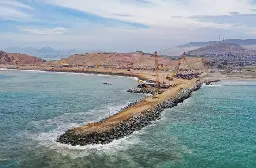
-
Peru and Cosco Shipping, a Chinese state-owned construction company, have settled a dispute over the business model to be put in place for the Port of Chancay, built under China's "Belt and Road Initiative". The company is granted the exclusive right to operate the port after it is inaugurated in a few months.
-
Earlier this year, however, as the work neared completion, Peruvian government lawyers filed a lawsuit challenging the exclusivity granted to the Chinese company, saying the facility should be available to other container handling companies as well.
-
But Chinese lenders and Peruvian industrial groups harshly criticized the move. Now, with Peruvian authorities taking a step back, the impasse should be settled.
-
Various business groups are now pushing for the construction of a road between the port and the Brazilian state of Acre, to speed up access to maritime trade with Asia, at the cost of more harm to the Amazon rainforest.
Yes, that's a very illuminating documentary. DW shows just half of it, the entire film has around 90 minutes and was available at www.arte.tv until three or so weeks ago. Maybe Arte TV puts it online again at a later time.
Taiwan raises travel alert for Mainland China, Hong Kong, Macau over Beijing's new judicial guidelines introducing death penalty for supporters of Taiwanese independence
Taiwan Mainland Affairs Council on Thursday raised the travel alert for Mainland China, Hong Kong and Macau to 'orange' level and advised people to avoid non-essential travelling. The Council claimed...
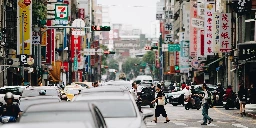
cross-posted from: https://feddit.org/post/380048
> Taiwan's government raised the travel alert for Mainland China, Hong Kong and Macau to “orange” level and advised people to avoid non-essential travelling. The Council claimed that because the Mainland China, Hong Kong and Macau have continued to amend or issue legal documents relating to national security in recent years, there are reported cases in which Taiwanese travelling to mainland China have been subjected to unlawful detention, retention and interrogation, as the Straits Exchange Foundation deputy secretary general Tsai Meng-chun suggested. > > One week ago, China published new judicial guidelines to introduce the death penalty for “particularly serious” cases involving supporters of Taiwanese independence, which included severe punishments for activities deemed as fragmenting the country or inciting secession. According to the Council, this poses a serious threat to the personal safety of Taiwanese travelling to mainland areas. Hence, it strongly recommended that Taiwan people should not enter China mainland, Hong Kong and Macau unless it is necessary, and should avoid discussing sensitive issues, photographing military sites, or carrying books on politics, history and religion.
Taiwan raises travel alert for Mainland China, Hong Kong, Macau over Beijing's new judicial guidelines introducing death penalty for supporters of Taiwanese independence
Taiwan Mainland Affairs Council on Thursday raised the travel alert for Mainland China, Hong Kong and Macau to 'orange' level and advised people to avoid non-essential travelling. The Council claimed...
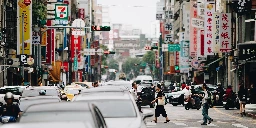
cross-posted from: https://feddit.org/post/380048
> Taiwan's government raised the travel alert for Mainland China, Hong Kong and Macau to “orange” level and advised people to avoid non-essential travelling. The Council claimed that because the Mainland China, Hong Kong and Macau have continued to amend or issue legal documents relating to national security in recent years, there are reported cases in which Taiwanese travelling to mainland China have been subjected to unlawful detention, retention and interrogation, as the Straits Exchange Foundation deputy secretary general Tsai Meng-chun suggested. > > One week ago, China published new judicial guidelines to introduce the death penalty for “particularly serious” cases involving supporters of Taiwanese independence, which included severe punishments for activities deemed as fragmenting the country or inciting secession. According to the Council, this poses a serious threat to the personal safety of Taiwanese travelling to mainland areas. Hence, it strongly recommended that Taiwan people should not enter China mainland, Hong Kong and Macau unless it is necessary, and should avoid discussing sensitive issues, photographing military sites, or carrying books on politics, history and religion.
British charity founder Peter Fouché dies while working as a combat medic on the front line in east Ukraine
Peter Fouché died last week while working as a combat medic in Ukraine, his charity said.

The British founder of a charitable organisation providing support to frontline soldiers in Ukraine has died "like a hero in the battlefield".
Peter Fouché, 49, from Fulham, west London, died on 27 June while working as a combat medic on the front line in east Ukraine, his organisation Project Konstantin said.
It said in a statement on social media: "There are no words that can do Pete’s life justice."
The organisation, which was founded in 2022, provides vehicles, drones, uniforms and food to soldiers in Ukraine.
Halyna Zhuk, commercial director and co-founder of Project Konstantin, said Mr Fouché "lived like a hero and died like a hero in the battlefield".
'Endless compassion'
In a statement released on Monday, the organisation said: "It is with the heaviest of hearts that we announce the passing of Pete, our beloved director and founder.
"There are no words that can do Pete’s life justice. No words or phrases that could ever encapsulate how much he meant to all of us.
"Pete's unwavering dedication, endless compassion, and relentless commitment to Ukraine and her people have left an everlasting impact on the countless lives he touched.
"His heroism knew no bounds. He was actively involved in saving more than 200 wounded Ukrainian soldiers, evacuating civilians from the most dangerous frontline cities, as well as bringing humanitarian aid to people in those towns and cities.
"Pete’s bravery and selflessness in the face of danger were nothing short of extraordinary, and his actions will forever be etched in our hearts."
A spokesperson for the Foreign, Commonwealth and Development Office confirmed it was supporting the family of a British man who died in Ukraine.
Maybe the author wanted to show that Betteridge's law of headlines is right? :-)
Can we trust textile factory audits in China? -- (25 min)
Can we trust textile factory audits in China?

Scott Nova, Executive Director of the Workers Rights Consortium (WRC) in Washington DC, gave Ecotextile Talks a hard-hitting interview questioning the reliability of social compliance audits in China’s textile sector.
He explaines how the WRC first began investigating the use of forced labour in Xinjiang when it emerged that US brand Badger Sports was sourcing university garments from a factory inside an internment camp in the region.
“In the course of our research, we learned that the Uyghur region, where all of these abuses were being carried out, including mass forced labour, was the source of a fifth of the cotton supply for the world’s leading apparel brands and retailers,” he said.
That led the WRC to help form a coalition of about 400 organisations, including trade unions, human rights organisations and faith-based bodies, to demand that global brands and retailers stop sourcing from the region.
Speaking about fashion industry stakeholders, he says: “I'm sure there are some that are actually claiming that they can conclusively demonstrate the absence of forced labour in the region, but no auditor should be working there. It’s incredibly disreputable.”
He also questions whether it’s possible to conduct a methodologically credible audit in China, and alleges that by operating there, sourcing teams are “enhancing the ability of the Chinese government to keep doing what it is doing to the Uyghur people.”
Nova and host Philip Berman discussed the impact of the Uyghur Forced Labor Prevention Act, in stopping goods made using forced labour coming into the US with Nova emphasising that “to our knowledge, nobody has overcome that rebuttable presumption,” that goods coming from that region were not made with forced labour.
Italy: lawyers file complaints of Uyghur forced labour over tomato paste exported from China's Xinjiang region
cross-posted from: https://feddit.org/post/375169
> Containers of tomato paste exported from Xinjiang to Italy are the subject of domestic criminal and international complaints filed by rights lawyers on behalf of Uyghur advocacy groups who allege that the goods were produced using Uyghur forced labor. > > The shipment was among 82 containers of agricultural products from China’s state-owned Xinjiang Agriculture and Animal Husbandry Investment (Group) Co., Ltd. shipped by rail and sea from Urumqi, capital of the Xinjiang Uyghur Autonomous Region, to southern Italy in late April, according to the plaintiffs. > > The shipment also sparked outrage among Italian farmers who protested against the arrival of the cheaper processed tomato products from China in what they said were unfair imports. > > The move comes less than two months after the European Parliament approved a new regulation banning products made with force labor from entering the European Union. The EU’s 27 member countries must approve the Forced Labour Regulation for it to enter into force and will have three years to implement it. “This legal challenge addresses both violations of fundamental principles of human dignity and international law instruments, as well as calling for the seizure of these recently imported goods under national law,” said a statement issued by these groups on June 3.
Amid a decline in democratic standards, the Serbian government uses large-scale installation of surveillance systems with facial recognition technology to monitor opponents, activists and journalists
As well as the large-scale installation of surveillance systems with facial recognition technology in urban areas, the authorities have sought to monitor opponents, activists and journalists, says a new report by BIRN.

cross-posted from: https://feddit.org/post/373442
> Archived link > > Here is the report (pdf). > > Serbian authorities have adopted invasive surveillance practices and facial recognition technology to monitor political opponents, civic activists and critical journalists, says a BIRN report entitled ‘Digital Surveillance in Serbia – A Threat to Human Rights?’, published on Friday. > > Equipment from Chinese manufacturers, such as Dahua and Hickvision, predominates. > > Serbia’s aspirations for EU membership mean that it faces pressure to adhere to EU standards on data protection and privacy as well as cybersecurity. However, Serbia has simultaneously strengthened ties with authoritarian countries, especially China and Russia.
Italy: lawyers file complaints of Uyghur forced labour over tomato paste exported from China's Xinjiang region
Containers of tomato paste exported from Xinjiang to Italy are the subject of domestic criminal and international complaints filed by rights lawyers on behalf of Uyghur advocacy groups who allege that the goods were produced using Uyghur forced labor.
The shipment was among 82 containers of agricultural products from China’s state-owned Xinjiang Agriculture and Animal Husbandry Investment (Group) Co., Ltd. shipped by rail and sea from Urumqi, capital of the Xinjiang Uyghur Autonomous Region, to southern Italy in late April, according to the plaintiffs.
The shipment also sparked outrage among Italian farmers who protested against the arrival of the cheaper processed tomato products from China in what they said were unfair imports.
The move comes less than two months after the European Parliament approved a new regulation banning products made with force labor from entering the European Union. The EU’s 27 member countries must approve the Forced Labour Regulation for it to enter into force and will have three years to implement it. “This legal challenge addresses both violations of fundamental principles of human dignity and international law instruments, as well as calling for the seizure of these recently imported goods under national law,” said a statement issued by these groups on June 3.
Italy's banking giant UniCredit challenges terms set by European regulator to cut its exposure to Russia, seeks ruling from the EU's General Court
UniCredit said on Monday it was challenging the terms set by the European Central Bank (ECB) for the Italian bank to cut its exposure to Russia, and seeking a ruling from the European Union's General Court, as well as a freezing of the request in the meantime.
Euro zone banks still involved with Russia more than two years after Moscow invaded Ukraine have come under growing pressure in recent weeks from the bloc's supervisors, as well as U.S. authorities, over their ties to the country.
A complex regulatory backdrop, involving Western sanctions against Moscow and local laws in Russia where the Italian group runs a retail bank, meant it had to "seek clarity and certainty" on the actions it needed to take, UniCredit said in a statement two and a half years after Russia's full scale invasion of Ukraine.
After Austria's Raiffeisen, UniCredit has the biggest exposure to Russia, where it runs a top 15 bank, among European lenders.
Raiffeisen has no plans to take legal action against the ECB over the request to reduce its Russia-related business, a spokesperson has said.
"For anyone who believes that Ukraine's fight against Russia is important for the security of Europe, the fact that UniCredit stayed in Russia, made profits, and is now suing the ECB over their attempts to get it to leave, this doesn't look good," said Nicolas Veron of Brussels think tank Bruegel.
Amid a decline in democratic standards, the Serbian government uses large-scale installation of surveillance systems with facial recognition technology to monitor opponents, activists and journalists
As well as the large-scale installation of surveillance systems with facial recognition technology in urban areas, the authorities have sought to monitor opponents, activists and journalists, says a new report by BIRN.

Here is the report (pdf).
Serbian authorities have adopted invasive surveillance practices and facial recognition technology to monitor political opponents, civic activists and critical journalists, says a BIRN report entitled ‘Digital Surveillance in Serbia – A Threat to Human Rights?’, published on Friday.
Equipment from Chinese manufacturers, such as Dahua and Hickvision, predominates.
Serbia’s aspirations for EU membership mean that it faces pressure to adhere to EU standards on data protection and privacy as well as cybersecurity. However, Serbia has simultaneously strengthened ties with authoritarian countries, especially China and Russia.
China starts smartphone inspections to boost 'anti-espionage efforts', raising fears among expatriates and foreign business people about arbitrary enforcement
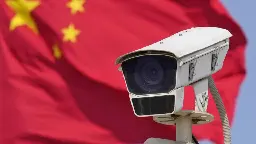
- China implemented new regulations on Monday under its toughened counterespionage law, which enables authorities to inspect smartphones, personal computers and other electronic devices, raising fears among expatriates and foreign businesspeople about possible arbitrary enforcement.
- A Japanese travel agency official said the new regulations could further prevent tourists from coming to China. Some Japanese companies have told their employees not to bring smartphones from Japan when they make business trips to the neighboring country, according to officials from the companies.
The new rules, which came into effect one year after the revised anti-espionage law expanded the definition of espionage activities, empower Chinese national security authorities to inspect data, including emails, pictures, and videos stored on electronic devices.
Such inspections can be conducted without warrants in emergencies. If officers are unable to examine electronic devices on-site, they are authorized to have those items brought to designated places, according to the regulations.
It remains unclear what qualifies as emergencies under the new rules. Foreign individuals and businesses are now expected to face increased surveillance by Chinese authorities as a result of these regulations.
A 33-year-old British teacher told Kyodo News at a Beijing airport Monday that she refrains from using smartphones for communications. A Japanese man in his 40s who visited the Chinese capital for a business trip said he will "try to avoid attracting attention" from security authorities in the country.
In June, China's State Security Ministry said the new regulations will target "individuals and organizations related to spy groups," and ordinary passengers will not have their smartphones inspected at airports. However, a diplomatic source in Beijing noted that authorities' explanations have not sufficiently clarified what qualifies as spying activities.
Last week, Taiwan's Mainland Affairs Council upgraded its travel warning for mainland China, advising against unnecessary trips due to Beijing's recent tightening of regulations aimed at safeguarding national security.
In May, China implemented a revised law on safeguarding state secrets, which includes measures to enhance the management of secrets at military facilities.
Deutschland: AfD-Mitglied soll auf dem Weg zum Parteitag in Essen einen Demonstranten gebissen und zwei SPD-Politikerinnen bespuckt haben
Ein AfD-Mitglied soll auf dem Weg zum Parteitag einen Demonstranten gebissen und zwei SPD-Politikerinnen bespuckt haben. Was bislang bekannt ist.
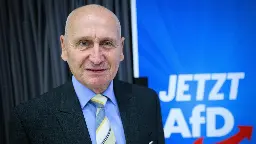
Auf dem Weg zum Parteitag in Essen hat der AfD-Delegierte Stefan Hrdy am Samstag offenbar zweimal Demonstrierende attackiert. Während sich Hrdy (67, ehemaliger GSG9-Polizist) in Interviews als Opfer inszeniert und von "Notwehr" spricht, witzelt er in Gesprächen mit rechten Aktivisten gut gelaunt über die Bissattacke. [...] Auf einem Video der "Bild"-Zeitung ist zu sehen, wie Hrdy auf eine Blockade von Gegnern der AfD stößt. Der Delegierte verlässt daraufhin seinen Wagen und geht auf eine Absperrung zu. Dort stellen sich ihm mehrere Demonstranten in den Weg. Es kommt zum Tumult, Hrdy geht zu Boden, ein Demonstrant liegt mit seinem Bein auf ihm. Anschließend umklammert Hrdy das Bein und beißt offenbar zu. Ein Polizist greift ein und trennt Hrdy und den Demonstranten. Kurz darauf ist zu sehen, wie der Demonstrant sein Hosenbein hochkrempelt und auf einen roten Abdruck zeigt.
In Interviews inszeniert sich Hrdy nun als Opfer und spricht von "Notwehr". Der Nachrichtenagentur dpa etwa sagte der 67-Jährige, er sei aus seinem Auto ausgestiegen, um einen Polizisten zu bitten, den Weg für ihn freizumachen. Dann sei er plötzlich attackiert worden. Weiter sagte der Delegierte aus Nordrhein-Westfalen: "Dann bekam ich einen Tritt in die rechte Wade, fiel hin und zwei oder drei sind auf mich drauf gefallen, ich sage mal gefallen, und dann kam ein Tritt von rechts, ich konnte ein bisschen ausweichen, habe mich dann in das Bein verklammert und zugebissen, damit ich nicht noch einen Tritt abbekomme." Dann hätten Polizeibeamte eingegriffen und er habe weiterfahren können. [...]
Im Gespräch mit dem rechten Aktivisten Patrick Kolek, der Hrdy auf der Plattform X als "den Zeckenbeisser [sic!] von Essen" und "den besten Mann der AfD" feiert, macht der 67-Jährige dagegen Witze über den Vorfall. Er bestätigt den Biss und gibt an, "von Kakerlaken bis Heuschrecken" schon alles gegessen zu haben, auch "Schlangen, Katzen, Hunde". Der gebissene Demonstrant hätte "neutral" geschmeckt. Er hätte "ein bisschen Pfeffer gebraucht", aber "das ging alles so schnell, da konnte ich nicht würzen." [...]
Bereits vor der Bissattacke soll Hrdy an einer anderen Blockade die SPD-Politikerinnen Patricia Seelig und Nina Gaedike bespuckt haben. Dem "Spiegel" bestätigte Seelig, die stellvertretende Bundesvorsitzende der Jusos, von Hrdy bespuckt worden zu sein und Strafanzeige erstattet zu haben. Demnach habe sie mit anderen Jusos zunächst ein Polizeiauto passieren lassen.
Als Hrdy hinterherfahren wollte, habe die Gruppe die Straße mit einer Sitzblockade gesperrt. "Er stieg dann aus, ging unvermittelt auf uns zu und spuckte uns ins Gesicht", sagt Seelig dem "Spiegel". "Da war nichts dazwischen, kein Innehalten, gar nichts. Das war wirklich krass", berichtet die Juso-Politikerin. Der WDR berichtete, die Beamten hätten den AfD-Deligierten nach seiner Spuckattacke gegriffen und rigoros zurückgeschubst. [...]
Eine Sprecherin des Protestbündnisses "Gemeinsam laut" sagte der Nachrichtenagentur AFP: "Das ist eine Form von Umgang, die uns schockiert, die wir ablehnen."
I have been thinking the same. Maybe ghost.org's federation over ActivityPub can solve the problem?
Ich hätte das so erwartet, aber nicht aus eigener Intuition, sondern weil es viele Studien gibt, die das praktisch alle bestätigen. Es gibt sogar zufällig eine aktuelle Meta-Studie dazu:
Drawing on both academic and industry sources, our research team combined the results from more than four decades of prior research on spending behaviour and payment methods into a large dataset.
This data spanned 71 research papers, 17 countries, and more than 11,000 participants. State-of-the-art meta-analysis techniques then allowed us to collectively analyse the results from all these prior studies, and re-examine their insights.
We found that cashless payments were indeed associated with higher levels of consumer spending compared to cash transactions, something that is referred to in the literature as the “cashless effect”.
This cashless effect was consistent across all other payment methods in the data set.
Put simply, it doesn’t matter whether you use a credit card, debit card or a buy-now-pay-later service – you are likely to spend more money using cashless methods than when you pay with cash.
Do social networks and their algorithms really amplify political hostility and polarisation? Interdisciplinary research nuances this pessimistic view.

Once upon a time, newly minted graduates dreamt of creating online social media that would bring people closer together.
That dream is now all but a distant memory. In 2024, there aren’t many ills social networks don’t stand accused of: the platforms are singled out for spreading “fake news”, for serving as Russian and Chinese vehicles to destabilise democracies, as well as for capturing our attention and selling it to shadowy merchants through micro targeting. The popular success of documentaries and essays on the allegedly huge social costs of social media illustrates this.
-
Studies suggest that if individuals regularly clash over political issues online, this is partly due to psychological and socioeconomic factors independent of digital platforms.
-
In economically unequal and less democratic countries, individuals are most often victims of online hostility on social media (e.g., insults, threats, harassment, etc.). A phenomenon which seems to derive from frustrations generated by more repressive social environments and political regimes.
-
individuals who indulge most in online hostility are also those who are higher in status-driven risk taking. This personality trait corresponds to an orientation towards dominance, i.e., a propensity to seek to submit others to one’s will, for instance through intimidation. According to our cross-cultural data, individuals with this type of dominant personality are more numerous in unequal and non-democratic countries.
-
Similarly, independent analyses show that dominance is a key element in the psychology of political conflict, as it also predicts more sharing of “fake news” mocking or insulting political opponents, and more attraction to offline political conflict, in particular.
-
n summary, online political hostility appears to be largely the product of the interplay between particular personalities and social contexts repressing individual aspirations. It is the frustrations associated with social inequality that have made these people more aggressive, activating tendencies to see the world in terms of “us” vs “them”.
-
On a policy level, if we are to bring about a more harmonious Internet (and civil society), we will likely have to tackle wealth inequality and make our political institutions more democratic.
-
Recent analyses also remind us that social networks operate less as a mirror than as a distorting prism for the diversity of opinions in society. Outraged and potentially insulting political posts are generally written by people who are more committed to express themselves and more radical than the average person, whether it’s to signal their commitments, express anger, or mobilise others to join political causes.
-
Even when they represent a relatively small proportion of the written output on the networks, moralistic and hostile posts tend to be promoted by algorithms programmed to push forward content capable of attracting attention and triggering responses, of which divisive political messages are an important part.
-
On the other hand, the majority of users, who are more moderate and less dogmatic, are more reluctant to get involved in political discussions that rarely reward good faith in argumentation and often escalate into outbursts of hatred.
-
Social media use seems to contribute to increasing political hostility and polarisation through at least one mechanism: exposure to caricatural versions of the political convictions of one’s rivals.
-
The way in which most people express their political convictions – both on social media and at the coffee machine – is rather lacking in nuance and tactfulness. It tends to reduce opposing positions to demonised caricatures, and is less concerned with persuading the other side than with signaling devotion to particular groups or causes, galvanising people who already agree with you, and maintaining connections with like-minded friends.
How Gazprombank’s Luxembourg subsidiary has made record profits since Russia’s full-scale invasion of Ukraine
GPB International, a subsidiary of Russia’s Gazprombank, has been operating in Luxembourg for over a decade. It survived the sanctions imposed on Russia for annexing Crimea, and the full-scale invasion of Ukraine brought the bank record profits. Meduza special correspondent Margarita Liutova explain...

-
GPB International, a subsidiary of Russia’s Gazprombank, has been operating in Luxembourg for over a decade. It survived the sanctions imposed on Russia for annexing Crimea, and the full-scale invasion of Ukraine brought the bank record profits.
-
Neither the EU nor the US have imposed blocking sanctions on the bank, allowing it to continue using the SWIFT system and conduct international payments. Gazprombank’s special status is a consequence of Europe’s dependence on Russian energy resources, primarily gas. Since payments for Russian energy supplies are made through Gazprombank, from the very start, the West decided not to impose restrictive measures, economists researching on sanctions say.
-
Though it’s based in Luxembourg, GPB International is no ordinary European bank: it’s a wholly-owned subsidiary of Russia’s Gazprombank, whose co-owners include people from Vladimir Putin’s inner circle.
-
Gazprombank’s Luxembourg subsidiary has never been publicly linked to the president’s inner circle. It hasn’t appeared in any high-profile document leaks or investigations by European law enforcement agencies.
-
Luxembourg is a convenient jurisdiction for many financial operations: the country’s legislation makes it easy to open companies, and its tax system is beneficial for investors (e.g., favorable dividend taxation). Many Russian banks and financial organizations, both state-owned and private, have taken advantage of this. For example, Alfa-Bank’s parent company, ABH Holdings SA, is registered in Luxembourg. Businessmen Mikhail Fridman and Petr Aven control the bank through this entity.
@[email protected] The "American aligned entities" seek alliances because of China's aggression, and they do so by collaborating not just with America but also with each other, e.g., Japan, the Philipines, Australia, and others. These countries collaborates voluntarily with each other because of China's imperialistic behaviour in the region, not because China is "boxed in" by any Western "entity".
Beijing has been disputing a lot of its neighbours' sovereignty on land and at sea, including India's and Russia's, and neither India nor Russia are exactly what I would call "American aligned entities". As @Buffalox already said, even the single-party communist country Vietnam with a similar authoritarian system seeks stronger ties with the USA rather China.
Taiwan is of massive strategic value because it would allow Chinese vessels to access the Pacific Ocean unimpeded.
China has been accessing the Pacific Ocean unimpeded for decades now, no one questions that. The reasons why China wants control over Taiwan are manifold, one being Taiwan's prominent role in the global supply chain, another is that it would give China better access to the South China Sea and its estimated reserves of 190 trillion cubic feet of natural gas and 11 billion barrels of oil.
Yeah, as you mention Vietnam: the interesting bit here maybe is that Vietnam -a single-party country with a similar totalitarian approach like China- appears to seek closer ties to the U.S. rather then to Beijing, at least that's my interpretation of the country/'s political moves over the last year or so.
Yeah, they work in a huge network mainly in Europe. As always, we should never trust blindly, but Epicenter appears to do a solid work. I have been disagreeing with what they said in the last years on some incidents, but all in all they do a good work. At least that's my opinion.
Epicenter Works is a digital rights organizations based in Austria.
You may have a particular perception of reality -a narrative- and then infer a claim. But it is a completely different thing if you have a claim and then seek to construct a narrative.
What this incident tells us is that the Chinese government doesn't know itself how to justify its claims, so it urges academics to find something to justify the claims of sovereignty over the sea (and the sea's estimated 11 billion barrels of untapped oil and 190 trillion cubic feet of natural gas, btw) against a wide range of (non-Western) countries like the Philippines, Taiwan, Vietnam, Indonesia, Malaysia, and Brunei.
The fact that China is pursuing its claims very aggressively makes this whole thing even worse (And, yes, other countries may do similar things, and it is bad too, but it doesn't justify China's move here.)
Arbeitszeitdebatte in Deutschland: Die unerträgliche Faulheit der anderen -- (Kommentar)
Je länger manche Politiker von Steuergeldern leben, desto aggressiver fordern sie andere zu mehr Fleiß auf, zum Beispiel Christian Lindner, Markus Söder und Jens Spahn. Woran liegt das?

Kommentar von Christian Stöcker, Kognitionspsychologe und seit Herbst 2016 Professor an der Hochschule für Angewandte Wissenschaften Hamburg (HAW). Dort verantwortet er den Studiengang Digitale Kommunikation. Vorher leitete er das Ressort Netzwelt bei SPIEGEL ONLINE.--
Je länger manche Politiker von Steuergeldern leben, desto aggressiver fordern sie andere zu mehr Fleiß auf, zum Beispiel Christian Lindner, Markus Söder und Jens Spahn. Woran liegt das?
Bei Christian Lindner liegt die Zeit, in der er so etwas wie einer wirtschaftlichen Erwerbsarbeit im engeren Sinne nachgegangen ist, ziemlich lang zurück. Lindner wurde mit 21 Jahren Abgeordneter, lebt seitdem also von Steuergeldern. Und gelegentlichen Honoraren, etwa von Banken.
Kurz vor seiner Wahl zum Abgeordneten war er vorübergehend Geschäftsführer einer von ihm selbst mitgegründeten Firma für die »Entwicklung und das Design komplexer Software-Lösungen, insbesondere für die mobile Kommunikation«. Die entließ ihn zuerst und ging dann pleite. Die Kreditanstalt für Wiederaufbau (KfW), die deutsche Förderbank also, die im Auftrag des Bundes und der Länder agiert, verlor dabei 1,2 Millionen Euro
Das mutet dann doch seltsam an
Markus Söder wiederum ging im Jahr 1994 zum letzten Mal einer geregelten Erwerbsarbeit nach, er arbeitete als Redakteur beim Bayerischen Rundfunk, wenn auch nur für etwa ein Jahr. Seit dreißig Jahren ist Söder Berufspolitiker.
Daran ist nichts Verwerfliches, irgendjemand muss den durchaus nicht ausschließlich attraktiven Job »Abgeordneter« ja machen. Und natürlich müssen gewählte Volksvertreterinnen und -vertreter von ihrem Einkommen leben können und im Idealfall genug verdienen, um nicht allzu anfällig für Bestechung zu sein. Ich persönlich habe schon von Berufs wegen nichts gegen steuerfinanzierte Anstellungen. Es gibt Aufgaben, die muss der Staat eben übernehmen.
Dass aber Menschen, die zum Bruttoinlandsprodukt in ihrem ganzen Leben praktisch nichts beigetragen haben, als Steuergelder zu beziehen und auszugeben, ihren eigenen Arbeitgebern – den Steuerzahlern – ständig erklären, dass sie gefälligst mehr arbeiten sollen, dem Gemeinwohl zuliebe, mutet doch etwas seltsam an.
»Wir müssen wieder mehr arbeiten«, sagt Markus Söder immer wieder. Mit »wir« meint er in Wirklichkeit: »ihr«. 2023 monierte die bayerische SPD , Söder bekomme Tausende Euro »fürs Blaumachen«, weil er bei nur 5 von 30 Landtagssitzungen anwesend gewesen war. Zur Erinnerung: Söder ist in Bayern Ministerpräsident.
Lindner sieht ein »Defizit«
Auch Christian Lindner wiederholt permanent, dass die Deutschen zu faul seien: Es existiere ein »Defizit an geleisteten Arbeitsstunden im Jahr«, die Deutschen sollten mehr arbeiten, und zwar zum Wohle der Nation : »Wenn Menschen arbeiten oder mehr arbeiten, zahlen sie schließlich höhere Steuern und Sozialabgaben und beziehen weniger soziale Transfers.«
Der Parteivorsitzende der sogenannten Liberalen fordert von deutschen Arbeitnehmerinnen und Arbeitnehmern also, gefälligst mehr zu arbeiten, damit sie anschließend mehr Steuern zahlen können. Gleichzeitig verweigert die FDP jede Art von Steuererhöhungen etwa für sehr reiche Menschen, die primär von Kapitalerträgen leben, höhere Erbschaftssteuern und so weiter. Das Vermögen von Menschen, die nicht arbeiten, ist der FDP heilig. Manchmal tragen die Risiken auch andere
Dabei könnte der Staat mit ein paar Änderungen, die nur »Hochvermögende« beträfen, seine Einnahmen um 100 Milliarden Euro steigern, sagt das Deutsche Institut für Wirtschaftsforschung (DIW).
Pro Jahr stehlen Umsatzsteuerbetrüger zudem geschätzte 20 Milliarden Euro aus der Staatskasse . Es wäre Lindners Job, das zu unterbinden – passiert ist leider nichts. Dazu kommen Einbußen durch Steuervermeidung und Steuerhinterziehung, manche Fachleute gehen von 50 Milliarden Euro pro Jahr aus , andere von 125 Milliarden . Appelle gegen Steuerhinterziehung liest man vom Finanzminister aber weit seltener als Beschwerden über die vermeintliche Faulheit der Deutschen.
Dieser hier ist von dieser Woche: »Wertschöpfung und Wachstum kommen von Arbeit, Leistungsbereitschaft und der Bereitschaft, unternehmerische Risiken zu tragen.« Manchmal tragen die Risiken auch andere, zum Beispiel die KfW.
Mutmaßlich Milliarden verschwendet
Auch der ehemalige Gesundheitsminister Jens Spahn ist sehr unzufrieden mit dem Fleiß seiner Arbeitgeber. Kürzlich verkündete er, Helmut Kohl habe in den Neunzigern ja mal vom »Freizeitpark Deutschland« gesprochen, um dann zu ergänzen : »Wenn ich mich umschaue, halte ich den Begriff zur Beschreibung unserer Probleme nicht für komplett abwegig.« In den Neunziger entstand übrigens auch der Begriff »Politikverdrossenheit«.
Jens Spahn ist in seinem Leben genau ein Jahr einer nicht steuerfinanzierten Beschäftigung nachgegangen, nämlich von 2001 bis 2002. Seit 2002, damals war er 22 Jahre alt, lebt auch er von Steuergeldern (und gelegentlichen Immobiliengeschäften ). Mutmaßlich hat er auch noch mehrere Milliarden Steuergeld durch sehr dubiose Deals mit FFP2-Masken während der Pandemie verschwendet . Als Steuerzahler wünscht man sich ja doch eher, dass Minister lieber ihre Arbeit ordentlich machen, als andere ständig zum Arbeiten anzuhalten.
Seltsam sozialistisch, gar nicht liberal
Auch Arbeitgeberverbände finden, dass die Leute, die nicht das Kapital, sondern die Arbeit haben, sich gefälligst mehr anstrengen sollen. Auch Michael Hüther vom arbeitgeberfinanzierten Institut der deutschen Wirtschaft klagt über den »unrealistischen Traum der Viertagewoche«. Die Industrie- und Handelskammer beklagt, dass viele Stellen gar nicht mehr besetzt werden könnten, die Leute deshalb mehr arbeiten sollten.
All das ist ein bisschen seltsam. Der Deal »weniger Geld und dafür mehr Freizeit« ist ja nun eine wirklich individuelle Entscheidung. Die fortwährenden Appelle, im Dienste der Allgemeinheit bitteschön mehr Zeit am Arbeitsplatz zu verbringen, erinnern ein bisschen an sozialistische Staaten: Da arbeiten ja gewissermaßen alle für alle, also sollen sich bitteschön auch alle gleichermaßen anstrengen.
»Liberal« ist an dieser Haltung dagegen rein gar nichts, denn sie stellt ja die Bedürfnisse der Volkswirtschaft über die des Individuums. Mehr noch: Sie stellt individuelle Entscheidungen als gemeinwohlschädlich infrage.
Die Deutschen sind keineswegs faul
Dazu kommt: Das Narrativ von den vermeintlich faulen Deutschen ist empirisch betrachtet falsch. Um die Fachleute vom Deutschen Institut für Wirtschaftsforschung zu zitieren: »So gab es seit der Wiedervereinigung mit knapp 46 Millionen nie mehr Menschen in Arbeit in Deutschland als heute. Und auch das Arbeitsvolumen der Beschäftigten, also die insgesamt geleisteten Arbeitsstunden pro Jahr, haben 2023 ein Rekordhoch erreicht.«
Lindners Forderung, Überstunden, also Mehrarbeit, steuerlich zu begünstigen, findet das DIW weltfremd, denn: »Basierend auf Daten des Statistischen Bundesamtes bekommen nur 18 Prozent der Beschäftigten, die in Deutschland Überstunden leisten, diese bezahlt.« In Deutschland schuften Arbeitnehmer also unentgeltlich mehr, als sie müssten, während reiche Menschen ihr Geld steuerfrei auf den Kaimaninseln oder in Panama parken. Das dunkle Geheimnis hinter dem Gejammer
Die Forderung nach einer Steuerbefreiung für Überstunden sei aus einer Vielzahl von Gründen »unsinnig bis kontraproduktiv«, so das DIW. Stattdessen solle man Kinderbetreuung ausbauen und Migrantinnen und Migranten besser in den Arbeitsmarkt integrieren.
Fakt: Deutschland überaltert, wie nahezu alle Industrienationen. Immer weniger junge Menschen müssen immer mehr Rentnerinnen und Rentner finanzieren. Zur Belohnung werden sie jetzt von Berufspolitikern angepflaumt.
Lösen lässt sich das, weil eine Steigerung der Geburtenraten offenbar schwierig bis unmöglich ist, nur mit gezielter Zuwanderung. Das aber findet beispielsweise die Union bekanntlich nicht so toll. Als diese Woche – endlich – ein Gesetz beschlossen wurde, das Einbürgerungen von Menschen, die hier leben und arbeiten, erleichtert und beschleunigt, reagierte die CDU sehr ungehalten und sprach von »weitreichenden negativen Folgen«.
Die Union verweist dabei gern auf die »Ostdeutschen«, die für schnellere Einbürgerungen kein Verständnis hätten. Auch die Menschen in Ostdeutschland möchten aber vermutlich gern eine Rente bekommen, wenn es so weit ist. Und in Wahrheit begegnen sie ziemlich selten Menschen mit Migrationshintergrund – über 94 Prozent davon leben nämlich in Westdeutschland und Berlin . Wir haben es hier nicht mit Besorgnis zu tun, sondern mit Rassismus.
Weil aber CDU und FDP so intensiv damit beschäftigt sind, beim Thema Zuwanderung der AfD nach dem Mund zu reden, sie also vorrangig als Problem zu beschreiben, traut sich das mit der Rente niemand so richtig laut zu sagen. Und die ultrareichen Großspender mit den Offshore-Briefkastenfirmen will man natürlich auch nicht vergraulen, also steht Steuervermeidung offenbar nicht so arg weit oben auf der To-do-Liste.
Und so schlägt man lieber noch ein bisschen auf die vermeintlich faule Jugend von heute ein. Das kommt auch bei den Rentnerinnen und Rentnern gut an, deren Stimmen man bei der nächsten Wahl wieder sehr gern hätte. Nutzen wird es nichts.
You are welcome 🤠
That's right. Done.
Yes, I fully agreed. Usually I don't post the SCMP as it is Chinese state-controlled media. I did it in that case (and in another post in this community) as it provides a glimpse into Chinese propaganda planning. This is why I posted it here, but please let me know if you think I am mistaken.
I don't like the source either, and usually I never link to SCMP or other Chinese propaganda media. In that case, however, I made an excemption (maybe it wasn't a good idea, just let me know that) as the article doesn't promote China's official agenda. The article is highly critical of the Chinese health system, even citing ordinary citizens' posts, and it comes from a paper like SCMP.
Don't know of Moon claims, but it's any dictator's playbook. It's worth reporting on things like that to remind us what's going on.
@Viking_Hippie First your are claiming that Chinese cars aren't manufactured in Xinjiang. When I provide evidence that this is false, you say "even so" and repeat your opinion. It seems whatever one says, no matter if evidence proofs otherwise, you "know" it better, continuing with your false narrative and spreading your opinion. Some may find such conversations funny, I say it is waste of time.
Your points in your statement above are false again.
Chinese cars aren’t even made in Xinjiang.
First, your statement is outright false, one example being the plant operated until recently by a subsidiary of SAIC-Volkswagen near Urumqi, the capital of China's Xinjiang Region. Volkswagen had to leave the joint venture with SAIC exactly over forced labour allegations.
And second, even if true it wouldn't matter as forced labour in China doesn't just take place in Xinjiang alone. There are many other examples across the country.
[Edit typo.]
What a rubbish! It's awful that the enslaved Chinese workers in Xinjiang and elsewhere in China actually are bearing the burdens of Chinese cheap cars.
The 'cyberspace' is designed to be decentralized, exactly the opposite of what you describe. China is trying to 'lead the way' into an Orwellian dystopia, and that's among the least things we need.